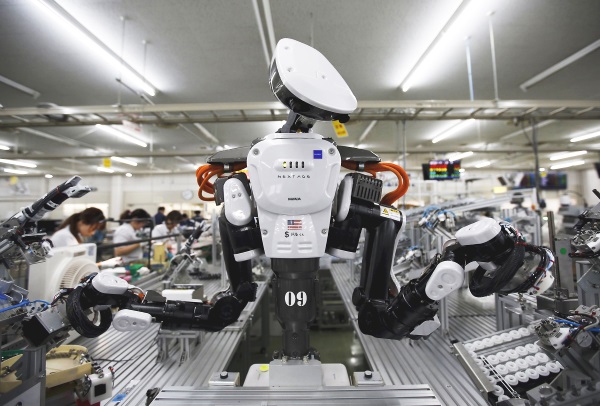If not, will the robots be ready to work for us while we have fun all day and enjoy life? We might ask them to compete in football and other games or participate in the Olympics, whilst we watch and applaud. Will advanced robots, androids, humanoids feel anything? If yes, then they might get distracted from their work too, as we humans do now and then, even when we shouldn’t.
Will robots build up memories?
With the advancement of ‘big data’ they should be able to do so. When properly programmed they should also be able to show empathy to us and to each other.
Survival of the fittest!
In order to defend our position, maybe we should start to upgrade ourselves. Add a bit of memory, a few quad processors extra, bionic eyes, super mechanical knees or hips or a new heart-pump, 3D printed in flesh and blood or biomechanical.
In the end what if everything in our body has been replaced by something biomechanical or artificial? Are we still human then? What about our memories? How would we download them on an external or internal extra memory device? Maybe the replacement of anything that doesn’t function in our body by something artificial is the way to eternal life.
Bye, bye Mrs. Jeanne Calment’s record of longevity, passing 122 years on this earth. Even the Jedis of Star Wars only lived for around 600 years and looked pretty dreadful in the end.
What about overcrowding of the planet if we all live forever?
Well, since we would potentially live eternally, there should be no problem travelling for thousands of light years to another planet. If we are fully mechanical I trust there will not even be a need for oxygen, allowing a wider choice of planets to visit. Who would need planets anyway if we are all mechanical?
But if we still feel things and have a visual memory we might want to go back, at least now and then, to the blue planet. Yet would sophisticated holograms of green trees, blue seas, white beaches and greyish mountains suffice? As the universe is said to be infinite, there is no need to care about overpopulation. There will always be another rock in space to go to.
All of this seems far away if we look at it through the current state of affairs and yet it could be round the corner if we accept the ever-accelerating speed of technological advance. It will be important to go with the flow in order not to become obsolete in a few years of time. However, development is rarely linear over time. There will be hiccups on the road ahead, but the direction seems to be unstoppable. I think we should join the trend.
When you compare new smartphones with the not-so-smart phones of five years ago, the giant technological leap is clearly evident. If you extrapolate that evolution five years in the future and accept that the speed of change will probably increase, we might already have a few microchips in our heads by then. I am looking forward to the new Blade Runner 2049 movie for any hints or clues of how things may look further down the road. In a generation from now your next door neighbours might be robots.
Photo: Japanese robot glory ltd







